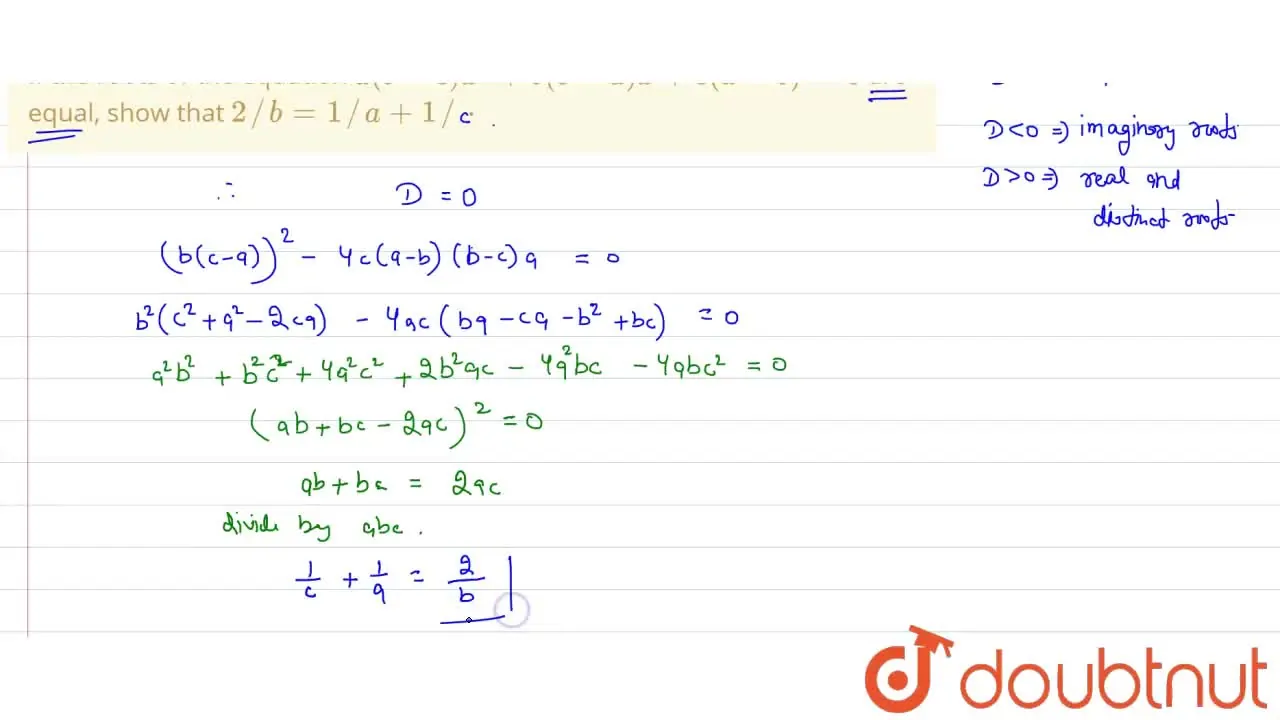If the roots of the equation a(b−c)x2+b(c−a)x+c(a−b)=0 are equal, show that 2/b=1/a+1/⋅
Since the roots of the given equations are equal, its discriminant is zero, i. e.,
b2(c−a)2−4a(b−c)c(a−b)=0
or b2(c2+a2−2ac)−4ac(ba−ca−b2+bc)=0
or a2b2+b2c2+4a2c2+2b2ac−4a2bc−4abc2=0
(ab+bc−2ac)2=0
or ab+bc−2ac=0
or ab+bc=2ac
or 1c+1a=2b [dividing both sides byu abc]
or 2b=1a+1c
Related Playlists
- BOOK - CENGAGE ENGLISHCHAPTER - THEORY OF EQUATIONSEXERCISE - SOLVED EXAMPLES14videos
THEORY OF EQUATIONS
- BOOK - CENGAGE ENGLISHCHAPTER - THEORY OF EQUATIONSEXERCISE - CONCEPT APPLICATION EXERCISE 2.13videos
THEORY OF EQUATIONS
- BOOK - CENGAGE ENGLISHCHAPTER - THEORY OF EQUATIONSEXERCISE - Multiple Correct Answer6videos
THEORY OF EQUATIONS
- BOOK - CENGAGE ENGLISHCHAPTER - STRAIGHT LINESEXERCISE - ARCHIVES (NUMERICAL VALUE TYPE)1videos
STRAIGHT LINES
- BOOK - CENGAGE ENGLISHCHAPTER - THREE DIMENSIONAL GEOMETRYEXERCISE - All Questions294videos
THREE DIMENSIONAL GEOMETRY
Similar Questions
If the roots of the equation a(b−c)x2+b(c−a)x+c(a−b)=0 are equal, show that 2/b=1/a+1/c.
View SolutionThe roots of the equation (b−c)x2+(c−a)x+(a−b)=0are
View SolutionIf the roots of the equation (b−c)x2+(c−a)x+(a−b)=0 are equal, then prove that 2b=a+c
View SolutionIf the roots of the equation (b−c)x2+(c−a)x+(a−b)=0 are equal, then prove that 2b=a+c.
View SolutionIf the roots of the equation (b−c)x2+(c−a)x+(a−b)=0 are equal then a,b,c will be in
View SolutionIf the roots of equation a(b−c)x2+b(c−a)x+c(a−b)=0 be equal prove that a,b,c are in H.P.
View SolutionIf the roots of the equation (x−b)(x−c)+(x−c)(x−a)+(x−a)(x−b)=0 are equal then
View Solution6.The roots of the equation (a−b+c)x2+4(a−b)x+(a−b−c)=0 are
View SolutionThe roots of the equation a(b−2c)x2+b(c−2a)x+c(a−2b)=0 are, when ab+bc+ca=0
View SolutionIf the roots of the equation (a2+b2)x2−2(ac+bd)x+(c2+d2)=0 are equal,
prove that ab=cdView Solution


